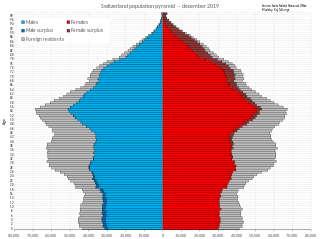
Switzerland, officially the Swiss Confederation, is a landlocked country located at the confluence of Western, Central and Southern Europe. The country is a federal republic composed of 26 cantons, with federal authorities based in Bern.

This article about the demographics of Switzerland features the population of the Swiss Confederation, including population density, ethnicity, education level, health of the populace, economic status, religious affiliations and other aspects of the population.

The four national languages of Switzerland are German, French, Italian, and Romansh. German, French, and Italian maintain equal status as official languages at the national level within the Federal Administration of the Swiss Confederation, while Romansh is used in dealings with people who speak it. Latin is occasionally used in some formal contexts, particularly to denote the country.

The federal administration of Switzerland is the ensemble of agencies that constitute, together with the Swiss Federal Council, the executive branch of the Swiss federal authorities. The administration is charged with executing federal law and preparing draft laws and policy for the Federal Council and the Federal Assembly.
The Ministry of Statistics and Programme Implementation (MoSPI) is a ministry of Government of India concerned with coverage and quality aspects of statistics released. The surveys conducted by the Ministry are based on scientific sampling methods.

The Federal Statistical Office (FSO) is a Federal agency of the Swiss Confederation. It is the statistics office of Switzerland, situated in Neuchâtel and attached to the Federal Department of Home Affairs.
A labor market area is a geographic area or region defined for purposes of compiling, reporting, and evaluating employment, unemployment, workforce availability, and related topics. It can be defined as an economically integrated region within which residents can find jobs within a reasonable commuting distance or can change their employment without changing their place of residence.
A labour market area is a spatially coherent area of cities and municipalities that enables meaningful statistics in terms of economic performance and jobs. The delimitation of the geographical area is based on statistical criteria and not on political organisation. A labour market area is defined as a region in which the majority of those employed there also live. The division of a country into labour market areas is widely used in statistical analyses and cartographic representations. The space is subdivided in such a way that spatial and temporal comparisons between units that are as similar as possible are possible. The method uses commuter flows between cities and municipalities as a characteristic. It thus enables uniform criteria for an entire country and is used in several European countries and by the Statistical Office of the European Union (Eurostat). Since settlement and land use of an area change considerably over time, the boundaries of the labour market areas must be revised regularly to ensure that they adequately reflect the current situation.
The Federal Business Census (BC) is a survey covering all second and third sector businesses and enterprises throughout Switzerland. The survey is conducted by the Swiss Federal Statistical Office (FSO) with the support of regional statistical offices. The aim of the survey is to collect complete data from all economic production units on economic, social and regional aspects. The BC is used to update the Business and Enterprise Register (BER), and serves as a reference for various statistics.
The Swiss Labour Force Survey (SLFS) - conducted by the Federal Statistical Office in cooperation with an external service provider - is a household survey that has been conducted since 1991. The main goal is to survey the employment structure and employment behaviour of the permanent resident population. Because of the strict application of international definitions in the SLFS, Swiss data can be compared with those of other OECD countries and the countries of the European Union. Since 2010, the SLFS has been conducted on a quarterly basis. The interviews from the third and fourth quarters of 2009 serve as a transition from the old to the new (continuous) SLFS.
The legal basis of official statistics in Switzerland is the Swiss Federal Constitution. Article 65 of the Swiss Federal Constitution sets out the mandate and competencies of official statistics.

The Swiss Agency for the Protection of Cultural Property defines measures to protect cultural property against damage, destruction, theft and loss. For this purpose, a legal basis has been established at the national level and international agreements have been made that oblige Switzerland to respect and support the protection of cultural property not only on its own territory but also on the sovereign territory of other state parties.
The Land Use Statistics of the Federal Statistical Office collect information in 12-year intervals about Switzerland's land use and land cover based on aerial photographs of the Federal Office of Topography (swisstopo). In addition to statistics, the Land Use Statistics also provides basic geodata in hectare resolution for Geographical Information Systems (GIS) of the Confederation, the cantons, research institutes and higher education institutions. Furthermore, it provides inputs for national programmes and indicator systems.
The first Federal population census in Switzerland took place in March 1850 under the direction of Federal Councillor Stefano Franscini. As well as counting the number of inhabitants, respondents were also asked about their sex, age, marital status, occupation and religion. Between 1860 and 2000, a census took place every ten years in December. The only exceptions to this 10-year rhythm were the population census of 1888 and the population census of 1941. The census of 2000 was the last to use traditional methods. Since 2010, the population census has been carried out and analysed annually in a new format by the Federal Statistical Office (FSO). In order to ease the burden on the population, the information is primarily drawn from population registers and supplemented by sample surveys. Only a small proportion of the population are surveyed in writing or by telephone. The first reference day for the new census was 31 December 2010.
The National Consumer Price Index measures the price inflation of key consumer goods for Swiss private households. The average of the population is used as a reference to obtain a "truthful" value. The CPI measures the price trend based on a basket of commodities containing about 1050 goods and services. These are weighted according to their share of the household budget.
The Health insurance premium index collects data on the evolution of premiums for compulsory and complementary health insurance and is the weighted average of the two sub-indices. By means of the Health insurance premium index, the effects of the evolution of premiums on the growth of households' disposable income can be calculated.
The Total Social Security Accounts are a synthesis statistic used in Switzerland to gauge expenditures and their financing in social security.

The Federal Department of Home Affairs is a department of the federal administration of Switzerland and serves as the Swiss ministry of the interior. As of 2012, it is headed by Federal Councillor Alain Berset.
Diving regulations are the stipulations of the delegated legislation regarding the practice of underwater diving. They apply within the national territory and territorial waters of a country. In most cases they apply to occupational diving, but in a few cases also to recreational diving. There are exemptions for recreational diving in some cases where it is recognised as a self-regulated industry. Offshore diving is generally outside the scope of diving regulations, and tends to be self-regulated through voluntary membership of industry organisations.
The Biodiversity Monitoring Switzerland (BDM) is a Swiss Confederation programme for the long-term monitoring of species diversity in Switzerland.